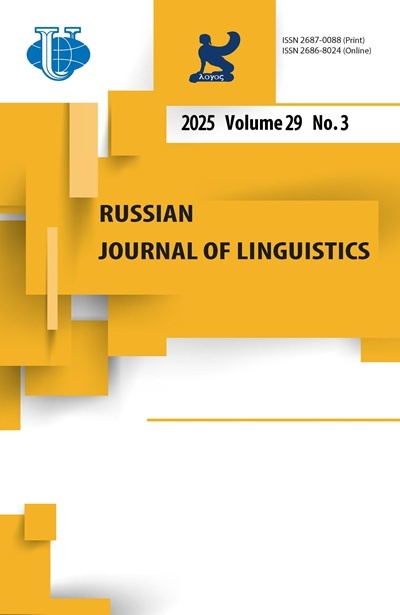Анализ терминов родства с помощью Естественного Семантического Метаязыка: подход Анны Вежбицкой
- Авторы: Которова Е.Г.1,2
-
Учреждения:
- Зеленогурский университет
- Национальный исследовательский Томский политехнический университет
- Выпуск: Том 22, № 3 (2018): Семантические исследования: к юбилею Анны Вежбицкой
- Страницы: 701-710
- Раздел: ОБЗОРЫ
- URL: https://journals.rudn.ru/linguistics/article/view/19353
- DOI: https://doi.org/10.22363/2312-9182-2018-22-3-701-710
- ID: 19353
Цитировать
Полный текст
Аннотация
В данной статье дается краткий обзор некоторых из работ Анны Вежбицкой, посвященных рассмотрению терминов родства в разных лингвокультурах (Wierzbicka 2016a, 2016b, 2017). Анализируется предложенный А. Вежбицкой подход к описанию семантики терминов родства с помощью Естественного Семантического Метаязыка (ЕСМ), основанного на использовании лексических универсалий. Показаны преимущества данного подхода перед другими методами анализа, в частности то, как он позволяет преодолеть евроцентризм в рассмотрении систем родства в не европейских культурах.
Ключевые слова
Об авторах
Елизавета Георгиевна Которова
Зеленогурский университет; Национальный исследовательский Томский политехнический университет
Автор, ответственный за переписку.
Email: e.kotorova@gmail.com
доктор филологических наук, профессор, Зеленогурский университет (Польша), Институт германской филологии, заведующая кафедрой лексикологии и прагмалингвистики / Национальный исследовательский Томский политехнический университет, профессор отделения иностранных языков. Сфера научных интересов: прагмалингвистика, лексическая семантика, контрастивная лингвистика, проблема межъязыковой эквивалентости, языки аборигенов Сибири (кетский язык).
al. Wojska Polskiego 71A, 65-762, Zielona Góra, Polska; 634050, Томск, Россия, проспект Ленина, дом 30Список литературы
- Bierwisch, Manfred (1969). Strukturelle Semantik. Deutsch als Fremdsprache, 62, 66-74.
- Goddard, Cliff & Anna Wierzbicka (2002). Semantic primes and universal grammar. In Cliff Goddard and Anna Wierzbicka (eds), Meaning and Universal Grammar - Theory and Empirical Findings. Vol. I. Amsterdam: John Benjamins. 41-85.
- Goddard, Cliff & Anna Wierzbicka (2014). Words and meanings: lexical semantics across domains, languages and cultures. Oxford: Oxford University Press.
- Goodenough, Ward (1956). Componential analysis and the study of meaning. Langauge, 32, 195-216.
- Jones, Douglas (2010). Human kinship, from conceptual structure to grammar. Behavioral and Brain Sciences, 33, 367-416.
- Keen, Ian (1985). Definitions of kin. Journal of Anthropological Research, 41, (1), 62-90.
- Khalil, Amr, Tatiana Larina, and Neelakshi Suryanarayan (2018). Sociocultural competence in understanding forms of address: case study of kinship terms in different cultural contexts. EDULEARN18 Proceedings. 10th International Conference on Education and New Learning Technologies. Palma de Mallorka, Spain. 2-4 July, 2018.
- Larina, Tatiana & Neelakshi Suryanarayan (2013). Madam or aunty ji: address forms in British and Indian English as a reflection of culture and cognition. In Monika Reif, Justina A. Robinson, Martin Putz (eds.) Variation in Language and Language Use: Linguistic, Socio-Cultural and Cognitive Perspectives Series “Duisburger Arbeiten zur Sprachund Kulturwissenschaft/ Duisburg Papers on Research in Language and Culture” (DASK). Peter Lang. 2013, 190-217.
- Larina, Tatiana & Amr Khalil (2018). Arabic forms of address: sociolinguistic overview. The European Proceedings of Social and Behavioural Sciences EpSBS, Volume XXXIX - WUT 2018: Word, Utterance, Text: Cognitive, Pragmatic and Cultural Aspects. Future Academy, 229-309. doi: http://dx.doi.org/10.15405/epsbs.2018.04.02.44.
- Lounsbury, Floyd (1969). The structural analysis of kinship semantics. In Stephen A. Tyler (ed.) Cognitive Anthropology. New York, London etc.: Holt, Rinehart and Winston, 193-311.
- Piaget, Jean (1928). Judgment and reasoning in the child. New York: Harcourt, Brace And Company.
- Read, Dwight W. (1984). An Algebraic Account of the American Kinship Terminology. In Current Anthropology 25, (4), 417-440.
- Wallace, Anthony F. C. & John Atkins (1969). The meaning of kinship terms. In Stephen A. Tyler (ed.) Cognitive Anthropology, New York, London etc.: Holt, Rinehart and Winston, 345-369.
- Wierzbicka, Anna (1986). Semantics and the interpretation of cultures: The Meaning of 'Alternate Generations' Devices in Australian Languages. In Man. New Series, 21 (1), 34-49.
- Wierzbicka, Anna (1987). Kinship semantics: Lexical universals as a key to psychological reality. In Anthropological Linguistics, 29 (2), 131-156.
- Wierzbicka, Anna (1992). Semantics, culture and cognition: Universal human concepts in culturespecific configurations. Oxford & New York: Oxford University Press, 1992.
- Wierzbicka, Anna (2010). Lexical universals of kinship and social cognition. In Behavioral and Brain Sciences, 33, 403-404.
- Wierzbicka, Anna (2013). Kinship and social cognition in Australian languages: Kayardild and Pitjantjatjara. In Australian Journal of Linguistics, 33, 302-321.
- Wierzbicka, Anna (2016a). New perspectives on kinship: Overcoming the Eurocentrism and scientism of kinship studies through lexical universals. In Nancy Bonvillain (ed.) The Routledge handbook of linguistic anthropology. New York: Routledge, 62-79.
- Wierzbicka, Anna (2016b). Back to ‘Mother’ and ‘Father’: Overcoming the Eurocentrism of kinship studies through eight lexical universals. In Current Anthropology, 57, (4), 408-429.
- Wierzbicka, Anna (2017). The meaning of kinship terms: a developmental and cross-linguistic perspective. In Zhengdao Ye (ed.) The Semantics of Nouns. Oxford: Oxford University Press, 19-62.
- Yuryeva, Julia, Ekaterina Rudakova, and Tatiana Larina (2018). Sociolinguistic and sociocultural features of language use: forms of address in British English and Spanish. EDULEARN18 Proceedings. 10th International Conference on Education and New Learning Technologies. Palma de Mallorka, Spain. 2-4 July, 2018.
- Которова Е.Г., Нефёдов А.В. Проблема представления этнокультурных реалий в словаре миноритарного языка (на примере кетской лексики) // Томский журнал лингвистических и антропологических исследований. 2016. № 3. С. 24—32 [Kotorova, Elizaveta & Andrei Nefedov (2016). The problem of presenting ethnocultural realia in a minority language dictionary (the case of Ket). Tomsk Journal of Linguistics and Anthropology, 3, 24—32].
Дополнительные файлы















